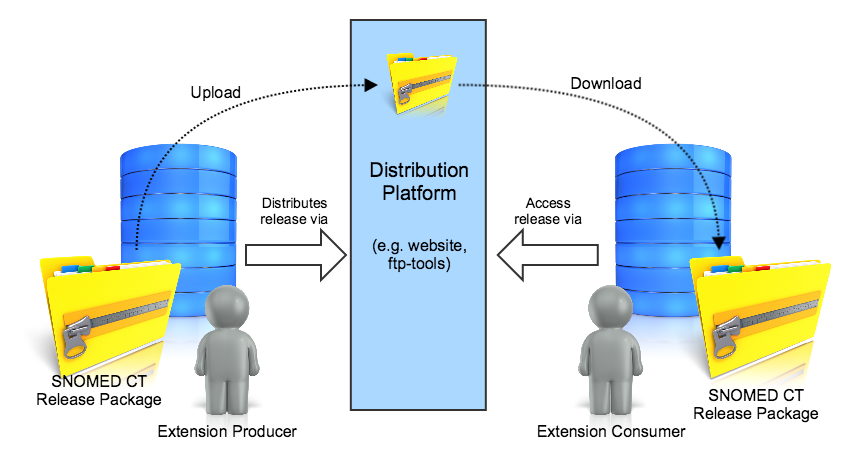
There are two main approaches to distributing SNOMED CT extensions and editions.
Either or both of these approaches may be applied by extension producers to make their content available to consumers.
The most common approach to distribution is using a file-based distribution approach, in which the SNOMED CT content is accessed via a distribution platform that allows a complete release package to be downloaded, as illustrated in the diagram below.

File-based distribution |
SNOMED International makes the International release available as downloadable packages, using a file-based distribution approach. The Member Licensing and Distribution Service (MLDS) is an online service for managing affiliate licenses for SNOMED International and participating Members, and for distributing SNOMED International products to affiliate licensees. An increasing number of SNOMED International Members use the MLDS to distribute their National Edition, including Denmark, Sweden, Norway, Belgium and the Netherlands. The MLDS serves two types of users:
The MLDS service can be accessed at MLDS.
In some Member countries, SNOMED CT is downloaded from a local platform provided by the National Release Center (NRC) of that country. For example:
To download SNOMED CT in a Member country:
Another option for distributing SNOMED CT is using a service-based approach. This approach allows users to access the entire release, or specific parts of the release via query services using a set of predefined Application Programming Interfaces (APIs).
Service-based distribution is illustrated in the diagram below.

Service-based distribution |
The extension producer may choose to provide different types of service-based distribution services, such as:
Using a terminology server API, extension producers can support the needs of extension consumers, without the consumer needing to download the full release files themselves. For example, the service could allow access to specific reference sets, support querying for the descendants of a particular concept, or determine the permitted range for a given attribute. Distribution services may also provide options for accessing different editions, and different versions of those editions.
As the range of possible terminology services is extensive, extension producers need to decide on an appropriate API to meet the needs of their consumers. Options include both standardized and commercial APIs, such as: